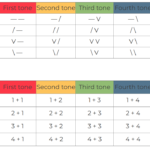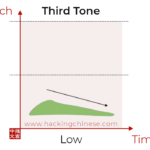Articles tagged with ‘Pronunciation’ Page 3
-
7 ways to write Mandarin tones
There are many ways of writing down the tones of Mandarin beyond the standard tone marks. Which are they and what pros and cons do they have for learners?
Read → -
How to learn Chinese pronunciation as a beginner
Pronunciation is an important, yet often neglected part of learning Chinese. The earlier you get the sounds and tones down, the better, but how should you approach learning these things as a beginner?
Read → -
A guide to Pinyin traps and pitfalls: Learning Mandarin pronunciation
When learning to pronounce Mandarin, you need to learn both the sounds and how they are written, usually with Pinyin. Did you know that many student errors actually come from a poor understanding of Pinyin, rather than the sounds themselves being difficult? Welcome to my guide to Pinyin traps and pitfalls.
Read → -
A smart method to discover problems with Mandarin sounds and tones
It’s often hard to assess one’s own pronunciation when learning Mandarin. People around you might understand what you are saying, but that doesn’t necessarily mean your tones are good. Simply asking people if your pronunciation is good won’t work either, because they will often tell you that your pronunciation is good even if it’s not. So how can you find out how good your pronunciation really is?
Read → -
What’s the difference between Chinese pronunciation and Pinyin? Does it matter?
It’s not uncommon for both students and teachers to treat Chinese pronunciation and Pinyin as the same thing, but they are not, and thinking that they are can lead to certain problems.
Read → -
Learning the second tone in Mandarin Chinese
Many students of Chinese struggle with the third tone, but almost as many also have problems with the second tone. So how should the second tone be pronounced, and what are the most common learner errors?
Read → -
Learning the third tone in Mandarin Chinese
The third tone in Mandarin is the most mispronounced of all. It’s an essentially low tone, but many learners are unaware of this, partly because the way the tone is taught is flawed. Don’t think of it as a falling-rising tone, just think of it as a low tone!
Read → -
The most serious mistake students make when learning Mandarin pronunciation
Learning to hear and say the sounds of Mandarin can be tricky, but it’s made much more difficult by the way many students go about it. By focusing on reading over listening, they are making themselves a big disservice!
Read → -
9 answers to questions about Pinyin and pronunciation
Pronunciation is best learnt by listening attentively and mimicking, but it’s also necessary to be able to learn Pinyin properly. This article answers nine questions about Pinyin and Chinese pronunciation.
Read → -
Why learning Chinese pronunciation by using English words is a really bad idea
Learning Mandarin pronunciation is not easy, so some people use English words to approximate Chinese pronunciation. This is a really bad idea.
Read →









